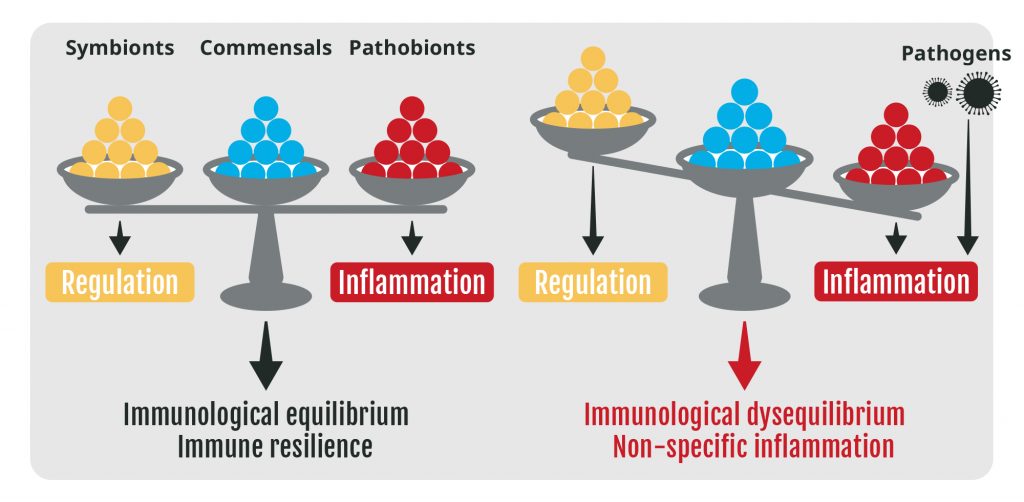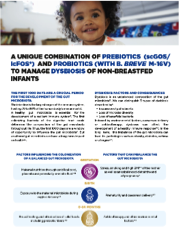The first 1,000 days are a crucial window for the colonization and development of the right bacteria in the gut.
Disrupted colonization – known as dysbiosis – due to maternal dysbiosis, cesarean section delivery, use of perinatal antibiotics or premature delivery may adversely affect the gut development of host defense, leading to increased susceptibility to disease later in life1-3.
Reductions in bifidobacteria and members of the Bacteroidaceae family (e.g. Bacteroides) are by far the most common perturbations in microbial composition following medical interventions, such as cesarean section and antibiotic use. On the other hand, genus Clostridium and the Enterbacteriaceae (e.g. Klebsiella, Escherichia coli) are likely to be more abundant in infants delivered by cesarean section, exposed to maternal antibiotics or treated with antibiotics2,3. There is also growing evidence that a balanced gut microbiota is a fundamental factor in strengthening the immune system and helping reduce the risk of allergy in later life2,3.
Therefore, a healthy gut microbiota plays a key role in the equilibrium and resilience of the immune system4.

Adapted from round et al. 200911
Nutrition plays a key role in the rebalancing of the gut microbiota2
Breast milk contains prebiotic oligosaccharides (HMO*) and beneficial bacteria that stimulate the immune system5. Breast milk probiotics work in synergy with prebiotic HMO* and naturally restore the balance of the gut microbiota, supporting the immune system (synbiotic effect5).
Synbiotics are a combination of pre- and probiotics that work synergistically. At Danone Nutricia Research, we have developed a specific, symbiotic combination that acts synergistically, not only resolving allergy symptoms in infants6-8, but also restoring the composition of the gut microbiota to reflect that of healthy breastfed infants8,9.
Indeed, clinical studies on infant formulas containing scGOS/lcFOS** (9:1) and Bifidobacterium Breve strain have been shown to contribute to restoring a healthy gut microbiota1,10.
*HMO: Human milk oligosaccharides
**scGOS/lcFOS (9:1): short-chain galacto-oligosaccharides / long-chain fructo-oligosaccharides

Infographic: Managing dysbiosis thanks to synbiotics
References
- Wopereis, Harm, et al. “The first thousand days–intestinal microbiology of early life: establishing a symbiosis.” Pediatric Allergy and Immunology 25.5 (2014): 428-438.
- Munyaka, Peris Mumbi, Ehsan Khafipour, and Jean-Eric Ghia. “External influence of early childhood establishment of gut microbiota and subsequent health implications.” Frontiers in pediatrics 2 (2014): 109.
- Fujimura, Kei E., et al. “Role of the gut microbiota in defining human health.” Expert review of anti-infective therapy 8.4 (2010): 435-454.
- Sommer, Felix, et al. “The resilience of the intestinal microbiota influences health and disease.” Nature Reviews Microbiology 15.10 (2017): 630.
- Scholtens, Petra AMJ, et al. “The early settlers: intestinal microbiology in early life.” Annual review of food science and technology 3 (2012): 425-447.
- Harvey, Bryan M., et al. “Effects on growth and tolerance and hypoallergenicity of an amino acid–based formula with synbiotics.” Pediatric research 75.2 (2014): 343.
- Burks, A. Wesley, et al. “Synbiotics‐supplemented amino acid‐based formula supports adequate growth in cow’s milk allergic infants.” Pediatric Allergy and Immunology 26.4 (2015): 316-322.
- Michaelis, L.W., et al. Allergy, EAACI 2016 abstract book, 2016. 71(S102): p. 3-94
- Haahtela, Tari, et al. “The biodiversity hypothesis and allergic disease: world allergy organization position statement.” World Allergy Organization Journal 6.1 (2013).
- Chua, Mei Chien, et al. “Effect of synbiotic on the gut microbiota of cesarean delivered infants: a randomized, double-blind, multicenter study.” Journal of pediatric gastroenterology and nutrition 65.1 (2017): 102-106.
- Round, June L. and Sarkis K. Mazmanian. “The gut microbiota shapes intestinal immune responses during health and disease.” Nature reviews immunology 9.5 (2009): 313.
BA19-485
